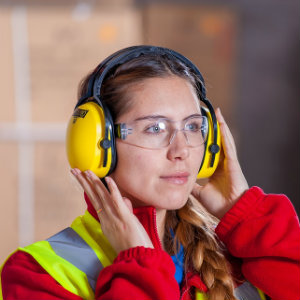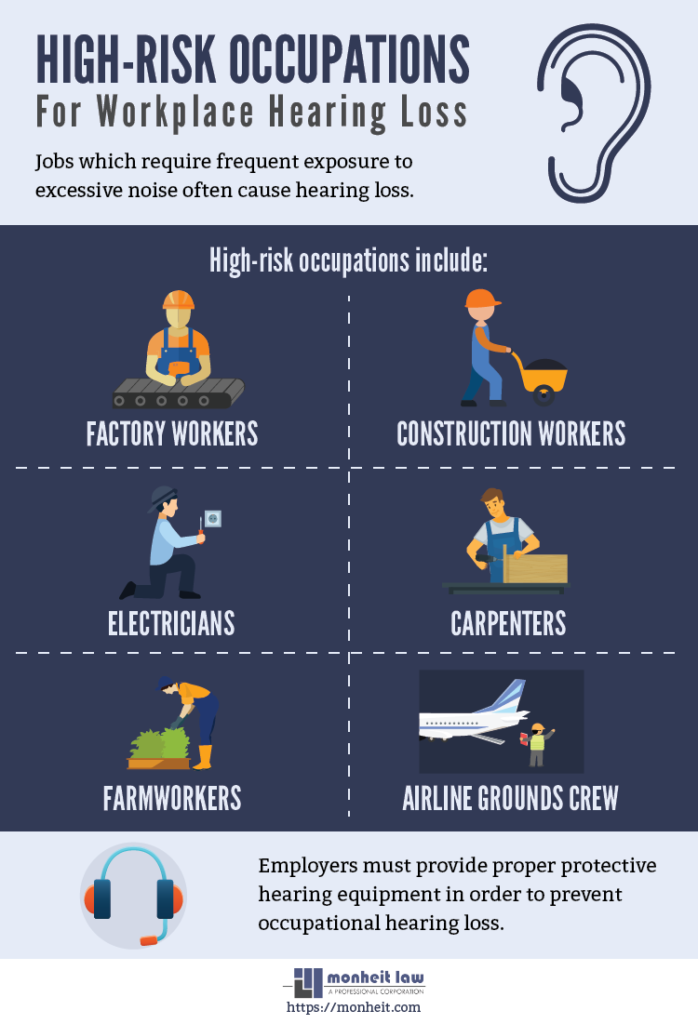Have you suffered hearing loss due to your working conditions? You may be wondering what to do next:
- Is hearing loss covered under Workers' Comp?
- How do I file a claim?
- What do I do if my claim gets denied?
- Can a lawyer help me get benefits?
Our dedicated work injury lawyers are here to help you recover compensation.

You deserve fair compensation for job-related hearing loss.
Many of us underestimate how damaging excessive noise can be. Next time you're at a concert, look around and see how many people are wearing ear plugs. You will probably only spot a handful, despite the well-known fact that frequent exposure to these noise levels can cause damage without adequate protection.
Many American workers are exposed to these hazards on a daily basis when they go to work. Over time, this exposure often leads to serious hearing problems which can greatly affect someone's life and career. Hearing loss can take away things you used to enjoy and sometimes prevent you from returning to work altogether.
When this happens, it's important that these workers have a safety net to fall back on. Workers' Compensation and Social Security disability benefits can help provide benefits when hearing loss affects someone's ability to work.
How Common Is Occupational Hearing Loss?
Excessive noise is the single greatest occupational hazard facing American workers today. According to the National Institute for Occupational Safety and Health (NIOSH), 10 million Americans have some form of noise-related hearing loss. Many of these conditions were likely due to work-related exposure, as NIOSH also claims that 22 million American workers experience hazardous noise exposure on the job each year.
In 2007, there were 23,000 reported cases of occupational hearing loss. However, the actual figure is probably much greater. Many workers may not realize that they have the option to apply for Workers' Comp and neglect to report their condition. It's important for all workers to be aware of their rights to benefits in the event of a work-related injury, illness, or acquired condition.
FREE CONSULTATION
Who Is At The Greatest Risk?
There are several US industries in which excessive noise is a natural byproduct of their production system. It's absolutely crucial that all employers in these industries provide thorough training for hearing loss prevention. The vast majority of occupational hearing loss could be prevented through the strict use of the proper protective equipment.
Those in the following occupations should be especially wary of the dangers of excessive noise:
- Factory workers
- Construction workers
- Electricians
- Carpenters
- Farmworkers
- Jobs involving loud music
- Airline ground and maintenance crews
There are laws which regulate how much noise you can be exposed to on the job. Any noise over 80 decibels can cause damage to your inner ear. This isn't as loud as you might think. Medline has provided the following examples, for reference:
- 90 dB - a large truck if you're standing within 5 yards
- 100 dB - what you'd experience at a loud rock concert
- 120 dB - a jackhammer about 3 feet away from you
- 130 dB - a jet engine 100 feet away from you
If you work in any of these industries and have suffered hearing loss, you shoulder consider meeting with a lawyer to discuss your options for compensation.

Is Hearing Loss Treatable?
Unfortunately, hearing loss is usually permanent. However, it's important to catch hearing loss early in order to prevent further damage. If you think you've noticed slight impairments to your hearing, you should not hesitate to discuss the matter with your doctor. Don't wait until too much damage is done.
While hearing loss may not be reversible, there are ways to cope. Depending on the severity, a hearing aid could make a big difference. You could also work with a specialist to learn how to communicate with the hearing you have left, how to read lips, and how to use sign language.
It's always tragic to see someone's quality of life decrease due to an occupational illness like hearing loss. It's important that these people receive the full benefits they're entitled to so that they can receive the treatment they need. You can learn to enjoy your life again even with hearing loss as long as you have the right resources.
How Can I Receive Benefits?
Any work-related injury or illness qualifies for benefits through Workers' Compensation. However, it can be difficult to prove that acquired conditions such as hearing loss and carpal tunnel syndrome are work-related. All injured workers should be aware of how insurance companies attempt to deny claims, but those with hearing loss should be especially aware of how difficult the claims process can be.
While you may face a tougher road than more obvious injuries like burns or broken bones, you can still get the benefits you're entitled to. An experienced work injury lawyer can help you gather the evidence you need for a successful claim, help you file your paperwork by deadlines, and deal with the insurance company on your behalf.
How Else Can A Lawyer Help?
Legal representation greatly increases your odds of filing a successful claim. Most injured workers don't have the time, energy, or resources to respond to an insurance company or employer's attempt to deny or a dispute their claim. These entities rely on people giving up once their claim has been rejected. Don't let them win - have your own legal counsel who knows how this system works and how to win claims and appeals.
Additionally, your lawyer can help you determine if you qualify for Social Security disability benefits in addition to Workers' Comp. These benefits are often necessary to help ends meet for people who are unable to return to the workforce because of occupational hearing loss.
Links For Further Reading
Monheit Law Montgomery County Office 215-866-2018
Directions to our Montgomery County Injury Law Office
4V4Q+FM Jenkintown, Pennsylvania
Open 24 hours
Hearing loss injury attorney Jenkintown
Civil law attorney
Employment attorney
Law firm
Attorney
Social security attorney
Monheit Law South Philly Office 215-302-0095
Directions to our South Philly Injury Law Office
WRCH+CP Philadelphia, Pennsylvania
Open 24 hours
Hearing loss injury attorney South Philly
Civil law attorney
Employment attorney
Law firm
Attorney
Social security attorney
